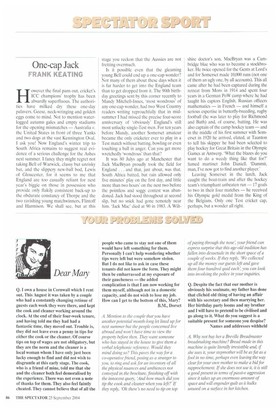One-cap Jack
FRANK KEATING
However the final pans out. cricket's ICC champions' trophy has been absurdly superfluous. The authorities have milked dry these one-day palavers. Geese, neck-wringing and golden eggs come to mind. Not to mention waterlogged autumn gales and empty stadiums for the opening mismatches — Australia v. the United States in front of three Yanks and two dogs at the vast Kennington Oval. I ask you! Now England's winter trip to South Africa remains to suggest real evidence of a serious challenge for the Ashes next summer. I fancy they might regret not taking Bell of Warwick, classy but unrisky bat, and the slippery new-ball hod, Lewis of Gloucester, for it seems to me that England are too casually reliant for next year's biggie on those in possession who provide only flakily consistent back-up to the obdurate constancy of Thorpe and the two ravishing young matchwinners, Flintoff and Harmison. We shall see, but at this
stage you reckon that the Aussies are not fretting overmuch.
Is it possible even that the gleaming young Bell could end up a one-cap wonder? Not many of them about these days when it is far harder to get into the England team than to get dropped from it. The 90th birthday greetings sent by this corner recently to Mandy Mitchell-Innes, 'most wondrous' of any one-cap wonder, had two West Country readers writing reproachfully that in midsummer I had missed the precise four-score anniversary of 'obviously' England's still most unlucky single-Test men. For ten years before Mandy, another Somerset amateur became the only cricketer ever to play in a Test match without batting, bowling or even touching a ball in anger. Can you get more wretchedly 'wondrous' than that?
It was 80 Julys ago at Manchester that Jack MacBryan proudly took the field for England . and that, just about, was that. South Africa batted, but rain allowed only five minutes' play on the first day, and little more than two hours' on the next two before the pointless and soggy contest was abandoned. Jack had stood throughout at second slip, but no snick had gone remotely near him. 'Jack Mac' died at 90 in 1983. A Wilt
shire doctor's son, MacBryan was a Cambridge blue who was to become a stockbroker. He twice opened for the Gents at Lord's and for Somerset made 10,000 runs (not one of them an ugly one, by all accounts). This all came after he had been captured during the retreat from Mons in 1914 and spent four years in a German PoW camp where he had taught his captors English, Russian officers mathematics — in French — and himself a serious expertise in butterfly-breeding, rugby football (he was later to play for Richmond and Bath) and, of course, batting. He was also captain of the camp hockey team — and in the middle of his first summer with Somerset in 1920 he arrived, elated, at Taunton to tell his skipper he had been selected to play hockey for Great Britain in the Olympic Games at Antwerp. 'What the blazes do you want to do a weedy thing like that for?' fumed martinet John Daniell. `Dammit, man, I've now got to find another player.'
Leaving Somerset in the lurch, Jack caught the boat-train and after the hockey team's triumphant unbeaten run 17 goals to two in their four matches — he received his Olympic gold medal from the King of the Belgians. Only one Test cricket cap, perhaps, but a wonder all right.


























































































 Previous page
Previous page